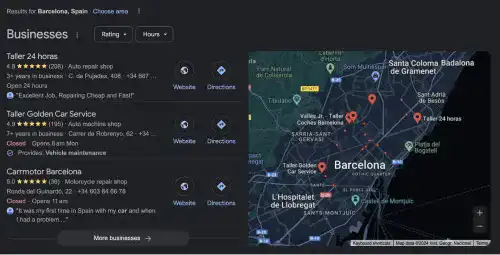Local SEO Essentials: Boost Your Visibility in Local Searches

What is Local SEO?
Local SEO is like ensuring your business is easy to find in your town or city when people search online. If you own a bakery in New York City, you want people in New York City to find it when they search for "best chocolate cake near me" or "bakery in New York City." Local SEO helps you show up in those search results.
Google Local Pack
The Google Local Pack, also known as the "Map Pack," is a section of Google's search results that displays local business listings that are most relevant to the search query. When someone searches for a service or product along with a location (for example, "coffee shops near me" or "car repair in Barcelona"), Google may show a Local Pack at the top of the search results.
This pack typically includes a map and a list of three businesses, along with important information such as their business name, ratings, hours of operation, and a link to call or get directions.

How to do Local SEO?
As the user's search intent and competition are more specific and granular in a local context, Local SEO requires particular approaches in addition to the standard SEO approaches.
Below are the five key considerations that are specifically required for Local SEO.
1. Google Business Profile Optimization
Google Business Profile (GBP), formerly known as Google My Business, is a free tool provided by Google that allows business owners to manage how their business information appears across Google platforms.
GBP is essential in Local SEO as the information provided through GBP is a key input for Google to understand the small and medium businesses in specific locations.
2. Local Keyword Research and Content Optimization
Local keyword research is vital for local SEO. It boosts visibility to a geographically targeted audience, leading to more relevant traffic and higher conversion rates.
The primary goal of local keyword research is to identify search queries specific to a business's location and services using keyword planning tools, such as Google Keyword Planner.
Adding geographic modifiers, understanding local terminology, and monitoring search trends are typically effective. Once you define the target keywords, optimize content across websites, social media, and local directories to enhance relevance in local search results.
3. Local Listings and Online Reviews
Local listings and online reviews are key to local SEO, boosting a business's visibility and credibility.
Local listings like Yelp and TripAdvisor make it easier for customers to find your business in search results and maps, enhancing your search rankings through consistent, accurate information.
Reviews act as social proof, influencing customer choices and improving search rankings due to perceived popularity and quality. It is important to encourage satisfied customers to leave positive reviews.
4. NAP Citations and Consistency
NAP citations are a fundamental aspect of local SEO and refer to instances where a business’s Name, Address, and Phone Number (NAP) are listed on the internet.
These citations can appear in local business directories, on websites and social media platforms, etc.
The consistency and accuracy of NAP citations across the web can significantly impact a business's local search engine rankings.
5. Mobile Optimization
Mobile optimization is critical for local SEO, as most people use their phones to search for local businesses and services.
As Google applies mobile-first indexing and emphasizes mobile-friendliness in the ranking factors, you need to ensure the website has a responsive design, works well on phones, loads quickly, and is easy to use. This can help attract more local customers.




